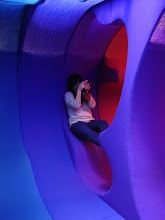Delta, a beautifully depicted film by Hungarian director Kornél Mundruczó, about a young man who had been long away from home suddenly returned to this remote delta area and met his estranged sister who he had never met before. Not long after, the sister decided to live with the brother and helped him build a house beside the distant wetland, away from the village. As their not-to-be-told relationship developed, the hatred and disgust were also grown among the local villagers, and led to an inevitable and tragical consequence.
Although relatively thin on the story-line, it was the strong visual narrative and rich soundscape that brought the film to life.
The director used long-duration and slow-traveling shots very often through out the whole film. The film began with a slow-traveling shot of a vast wetland, almost like an Impressionism landscape painting with saturated blue water and orange dusk sky, yet it wasn't the water surface that divided the blue and orange but the sound of the engine that urged the boat moving forward and the rippled that drawn behind, also indicated the arrival of the young man. A static and long-duration shot of rows of boats with old villagers in black clothes informing a funeral reminded me very much of the master Greek filmmaker, Theodoros Angelopoulos' Trilogy: The Weeping Meadow. In the opening scene, a significant numbers of Greek refugees arriving from background seashore to the foreground riverbank in a foggy, gloomy day.
Acoustically, plentiful in soundtrack as well as natural sound recording. Cello tenderly played along with scenes of the delta area, the mysterious landscape, and switch to folk music when entering the local bar. Water splashing, hammering nails, timber cracking, frogs and owls sang in turn at night. Rich but not redundant.
It's a film that didn't have much dialogue but narrated through images, and assisted by sound, it said more, no extra verbal words needed.
Subscribe to:
Post Comments (Atom)

No comments:
Post a Comment